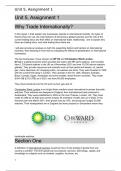Unit 5, Assignment 1
Unit 5, Assignment 1 .
Why Trade Internationally? .
In this report, I shall explain why businesses operate in international markets, the types of
finance they can use, the main features of becoming a global business and the role of the
current trading blocs and their effect on international trade. Additionally, I am to explain why
there are trading blocs, and what trading blocs there are.
I will also provide an analysis on both the supporting factors and barriers on international
business, then following in from this by evaluating the effects of globalisation on international
businesses.
The two businesses I have chosen are BP Oil and Christopher Ward London.
BP Oil is a global business which provides the nation with BP petrol stations, and currently
have 1,218 petrol stations in the UK as of November 2021 and over 18,700 service stations
globally. They provide resources and products such as fuel (petrol and diesel), oil, natural
gas, motor lubricants, EV charging points, car washes and more. They were founded in 1909
with the current HQ being in London. They operate in the UK, USA, Western Australia,
Brazil, Canada, Egypt, Azerbaijan and some smaller, lesser-known countries. They made
$164.19B (£133.37B) as of 2021 and have 60,000 employees.
They import products into the UK such as fuel, gas and oil.
Christopher Ward London is an Anglo-Swiss medium-sized international business that sells
watches. Their watches are designed in England, then manufactured and produced in
Switzerland. They were established in 2004 on the river Thames, London, UK. They have
made £13.6M as of 2022 and current employ 55 members of staff, also as of 2022. In the
financial year end March 2021, their growth rose by 19%, and produced roughly 20,000
watches. Their headquarters are in England and have property in Switzerland where they
handmade watches.
Section One .
A definition of international business would be how it is the trading of goods from one
country to another. The term goods can be products, services, technology, capital, and
knowledge on subjects such as markets, supplies, its prices, etc.
1




